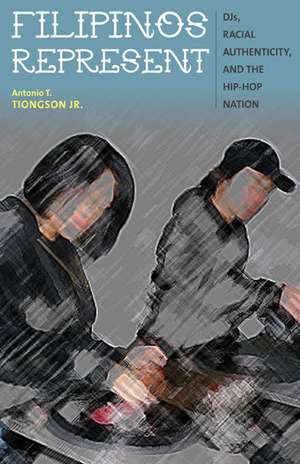Filipinos Represent: DJs, Racial Authenticity, and the Hip-hop Nation
Autor Antonio T. Tiongson Jr.en Limba Engleză Paperback – iul 2013
The “Hip-hop Nation” has been scouted, staked out, and settled by journalists and scholars alike. Antonio T. Tiongson Jr. steps into this well-mapped territory with questions aimed at interrogating how nation is conceptualized within the context of hip-hop. What happens, Tiongson asks, to notions of authenticity based on hip-hop’s apparent blackness when Filipino youth make hip-hop their own?
Tiongson draws on interviews with Bay Area–based Filipino American DJs to explore the authenticating strategies they rely on to carve out a niche within DJ culture. He shows how Filipino American youth involvement in DJing reconfigures the normal boundaries of Filipinoness predicated on nostalgia and cultural links with an idealized homeland. Filipinos Represent makes the case that while the engagement of Filipino youth with DJ culture speaks to the broadening racial scope of hip-hop—and of what it means to be Filipino—such involvement is also problematic in that it upholds deracialized accounts of hip-hop and renders difference benign.
Looking at the ways in which Filipino DJs legitimize their place in an expressive form historically associated with African Americans, Tiongson examines what these complex forms of identification reveal about the contours and trajectory of contemporary U.S. racial formations and discourses in the post–civil rights era.
Tiongson draws on interviews with Bay Area–based Filipino American DJs to explore the authenticating strategies they rely on to carve out a niche within DJ culture. He shows how Filipino American youth involvement in DJing reconfigures the normal boundaries of Filipinoness predicated on nostalgia and cultural links with an idealized homeland. Filipinos Represent makes the case that while the engagement of Filipino youth with DJ culture speaks to the broadening racial scope of hip-hop—and of what it means to be Filipino—such involvement is also problematic in that it upholds deracialized accounts of hip-hop and renders difference benign.
Looking at the ways in which Filipino DJs legitimize their place in an expressive form historically associated with African Americans, Tiongson examines what these complex forms of identification reveal about the contours and trajectory of contemporary U.S. racial formations and discourses in the post–civil rights era.
Preț: 111.69 lei
Preț vechi: 153.28 lei
-27% Nou
Puncte Express: 168
Preț estimativ în valută:
21.37€ • 22.23$ • 17.65£
21.37€ • 22.23$ • 17.65£
Carte indisponibilă temporar
Doresc să fiu notificat când acest titlu va fi disponibil:
Se trimite...
Preluare comenzi: 021 569.72.76
Specificații
ISBN-13: 9780816679393
ISBN-10: 0816679398
Pagini: 152
Dimensiuni: 140 x 216 x 13 mm
Greutate: 0.17 kg
Ediția:1
Editura: University of Minnesota Press
Colecția Univ Of Minnesota Press
ISBN-10: 0816679398
Pagini: 152
Dimensiuni: 140 x 216 x 13 mm
Greutate: 0.17 kg
Ediția:1
Editura: University of Minnesota Press
Colecția Univ Of Minnesota Press
Notă biografică
Antonio T. Tiongson Jr. is assistant professor of American studies at the University of New Mexico. He is coeditor of Positively No Filipinos Allowed: Building Communities and Discourse.
Cuprins
Contents
AcknowledgmentsIntroduction: Claiming Hip-hop1. The African Americanization of Hip-hop2. The Racialization of DJ Culture3. "The Scratching is What Got Me Hooked": Filipino American DJS in the Bay Area4. "DJing as a Filipino Thing": Negotiating Questions of Race5. The Normative Boundaries of FilipinonessConclusion: Reimagining the Hip-hop Nation
NotesIndex
AcknowledgmentsIntroduction: Claiming Hip-hop1. The African Americanization of Hip-hop2. The Racialization of DJ Culture3. "The Scratching is What Got Me Hooked": Filipino American DJS in the Bay Area4. "DJing as a Filipino Thing": Negotiating Questions of Race5. The Normative Boundaries of FilipinonessConclusion: Reimagining the Hip-hop Nation
NotesIndex
Recenzii
This book offers a compelling account of Filipino American DJ culture as a site for negotiating cultural authenticity, racial identity, and gender politics. Antonio T. Tiongson Jr. gives us a highly engaging and nuanced critique of what is at stake when young Filipino Americans enter the ‘Hip-hop nation’ and rethink Filipinoness in the post-Civil Rights era. It will be of interest to anyone grappling with questions of interracial solidarity, colorblindness, diasporic culture, and globalization that loom large today.—Sunaina Maira, University of California, Davis
Filipinos Represent boldly asks what is at stake in defining the public meanings of hip-hop, identifying the stakes of hip-hop as an ethnic and racial practice that elucidates how Filipino American DJs experience race. Particularly compelling about Tiongson Jr.’s research are the interviews he provides with practitioners of the craft. Their narratives and his contextualization of what meanings accrue around these symbols and performative modes are rich and nuanced.—Anita Mannur, Miami University of Ohio
Descriere
Antonio T. Tiongson draws on interviews with Bay Area–based Filipino American DJs to explore the authenticating strategies they rely on to create a niche within DJ culture. He shows that while the engagement of Filipino youth with DJ culture speaks to the broadening racial scope of hip-hop, such involvement also upholds deracialized accounts of hip-hop and renders difference benign.
